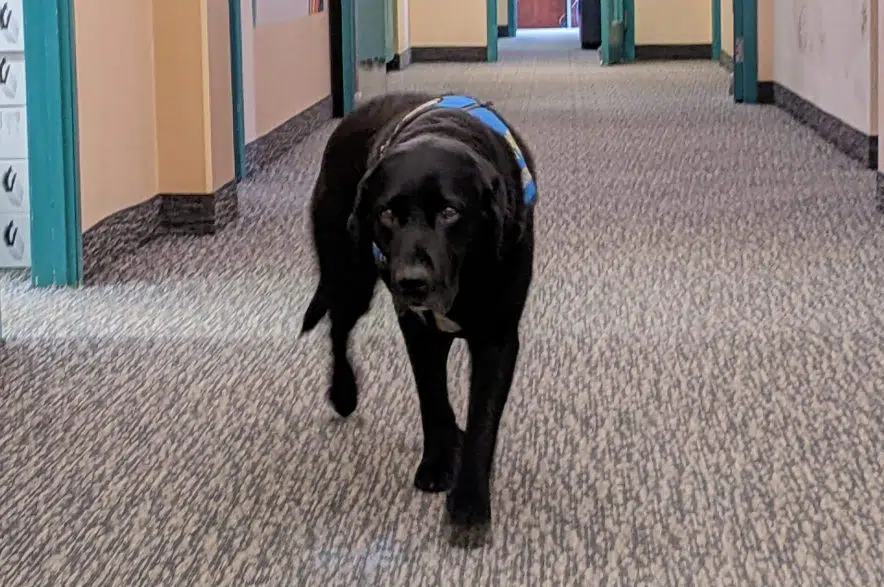Yes, even dogs can retire.
Last Friday, the Regina Police Service (RPS) announced Merlot the therapy dog was retiring after eight years with the department.
She came to the RPS in 2015 from Burnaby, B.C., where she was born, raised and trained for two years by Pacific Assistance Dogs.
The idea to bring a therapy dog onto the RPS team came in 2013, when former police chief Troy Hagen went to a conference and heard a presentation from one of the first facility dog handlers in Canada about the work that dogs like Merlot could do.
After the presentation, Hagen was sold on the idea and decided to pursue getting the department a therapy dog.
Some research and work was eventually done and Sgt. Tia Froh ended up being matched up with Merlot. Froh was then tasked with creating a work schedule for Merlot.
Merlot’s role during her time with the RPS mainly focused on helping kids at the Regina Children’s Care Centre and bringing a calming presence to those going through a difficult time.
Froh explained what her typical day was like while working at the centre with Merlot.
“Typically what you would see is me going into one of our family rooms. I’d introduce myself and Merlot and Merlot would know who would need her the most and gravitate towards that person,” Froh said Tuesday.
“Sometimes the child might be there to talk about the incident, but it’s the parent or caregiver that’s struggling outwardly more than the child and Merlot would gravitate towards that caregiver.”
When it would come to people being visibly upset when talking about a situation, Merlot would jump into action and do what she could to calm down whoever was stressed.
“Merlot is up on a couch laying beside an individual. There’s been times where the person she’s with has tears, is crying, their voices are raised and upset, (they’re) shaking, and Merlot would reach up, lick the tears away, give them nudges or put her body on top of their lap,” Froh added. “It has that calming effect and brings them back to, ‘OK, I got this.’ ”

Therapy dog Merlot will be relaxing after retiring following eight years with the Regina Police Service. (Shane Clausing/980 CJME)
While some will ask why Merlot needs to retire, Froh says age and stress is what got to the dog as she nears 10 years of age.
“The dogs do carry the stress (from) the people they’re following or helping. So my job is to make sure after an interview or court (that) she gets to shake it off, just like you and I at the end of the day,” Froh said.
“Merlot needs to be able to handle stress and chaos every day for her 10-hour shift. As the year progressed last year, she was showing me signs that the stress was becoming too much. She wasn’t as engaged anymore and checked out more than she ever had.”
With Merlot’s career in the RPS now over, she won’t get a pension, but rather she’ll be getting to enjoy her remaining years as just a normal dog, according to Froh.
“We have another dog at home and they’re going to hang out, be dogs, go on adventures and live the life she deserves after retirement — just have fun and not have to worry about anything,” Froh said.
“She also loves the lake and swimming,” Froh added, “so just being outside, getting as much food as she could possibly sneak out of people and she’ll be happy.”
With Merlot leaving, the RPS is looking for a new dog.
While the police service is in the process of getting a new dog, Froh notes it’s a lot tougher to get one now than it was eight years ago.
“The world is seeing the benefits of these dogs and so now everyone wants a dog,” she explained. “It’s quite the process for the application and then to get matched with that right dog for your agency. We’re in the process. Another handler will be taking over the next dog and we’ll announce that when the day comes.”
While the competition is tougher to get the dogs, Froh feels that’s a good thing for police departments around the world.
“It’s not your typical police dog. We’re taking policing in a new direction,” she said. “I think lots of the agencies want them; I think it’s just about finding that right person to get it started.
“I would hope every police agency around the world would have (a therapy dog) working with them at some point.”











